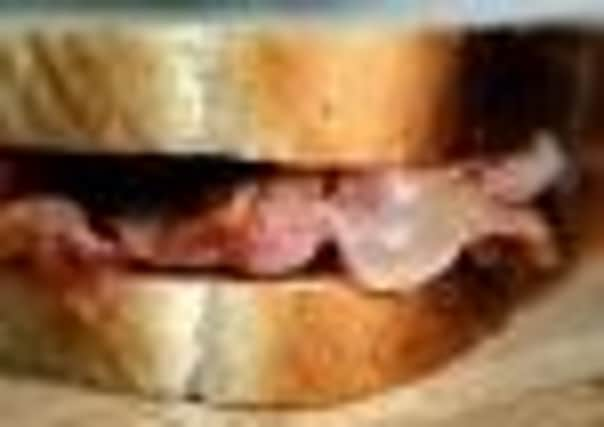Is new ruling on bacon one of the EU’s rasher decisions?


WHETHER it’s in a sarnie or a full English breakfast, bacon is one of our nation’s favourite foods.
But under planned EU rules, rashers with water content over five per cent will no longer be sold as “bacon”, but “bacon with added water.” Under existing UK law, this icon of the British breakfast table can consist of up to 10 per cent water before it has to carry a label saying it contains added water.
Advertisement
Hide AdAdvertisement
Hide AdHowever, the new European Parliament regulations, due to be ratified in the autumn, are halving this following concerns at the way some suppliers pumped up meat to make bigger portions.
The new labelling rule, which could come into force within four years, has been opposed by supermarkets and suppliers but welcomed by foodies, who argue it will stop bacon’s distinctive flavour being diluted.
The Department for Food, the Environment and Rural Affairs (Defra) is backing the move, saying consumers deserve to know what else is going into their bacon. “This change will make it clearer to shoppers exactly what they’re buying so they can make informed choices,” a spokeswoman said.
It comes after years of complaints about the amount of white gunk that seeps out of bacon when it’s cooked and the move is seen by many as a response to this, rather a case of the EU handing out dictats from its ivory tower.
Advertisement
Hide AdAdvertisement
Hide AdNevertheless, most bacon sold in this country contains more than five cent water and retailers are worried that it could confuse some consumers.
“We are concerned the nature of the product could change significantly and that any change could be confusing for consumers who perhaps wouldn’t understand that they were buying the same product that now just had an ‘added water’ label,” says Sarah Cordey, of the British Retail Consortium.
“The water provides succulence, taste and texture that people have come to associate with bacon, and in the UK most of the bacon that you find on the supermarket shelves doesn’t have less than five per cent water.”
She questions, too, whether the change is being driven by the public. “I’m not aware of there being a massive consumer campaign against bacon. Consumers do have a lot of power in this country and if they were unhappy with the standard of bacon they were buying from the supermarket then they would go elsewhere.”
Advertisement
Hide AdAdvertisement
Hide AdThe new rules apply to pre-packed foods but butchers will also have to label the ingredients going into the bacon they sell.
There are fears this will hit British producers more than their European counterparts, where dry curing is more popular, while the Provision Trade Federation has warned that changes to production methods would be expensive and the cost of bacon would have to rise.
But Kath Dalmeny, of real food campaign group Sustain, doesn’t believe the changes will force the price of bacon up. “The new label will only appear above the ingredients list on the back of packaging and the information on the front won’t change, so the idea that this could put prices up is scaremongering on the part of the industry,” she says.
“Most labelling legislation is there to make sure people have good information about what it is they’re buying. A few years ago there was an outcry over chickens being pumped full of water so that when customers bought them they looked very plump and then they shrank during cooking. It was perfectly legal and it still is but people now know how much water is in a chicken before they buy it.”
Advertisement
Hide AdAdvertisement
Hide AdRichard Longthorp has been breeding pigs near Howden in East Yorkshire for 25 years. He supports the proposed EU changes.
“I hear a lot of complaints from people about the white stuff coming out of bacon and, in my personal view, anything we can do to make the customer experience more satisfying has to be a good thing.
“It’s the fat, the marbling, that gives bacon succulence rather than the brine injected into it.”
He also believes food has been far too cheap for too long. “Perhaps if food prices continue to increase in this way consumers may become more discerning in what they buy.
Advertisement
Hide AdAdvertisement
Hide Ad“As food becomes more expensive, instead of buying ‘three for two’ offers and ‘buy one, get one free,’ if in the long run they become more concerned with quality, then that will be a good thing for British farmers because we can, and do, produce a lot of excellent pork, bacon and ham.”